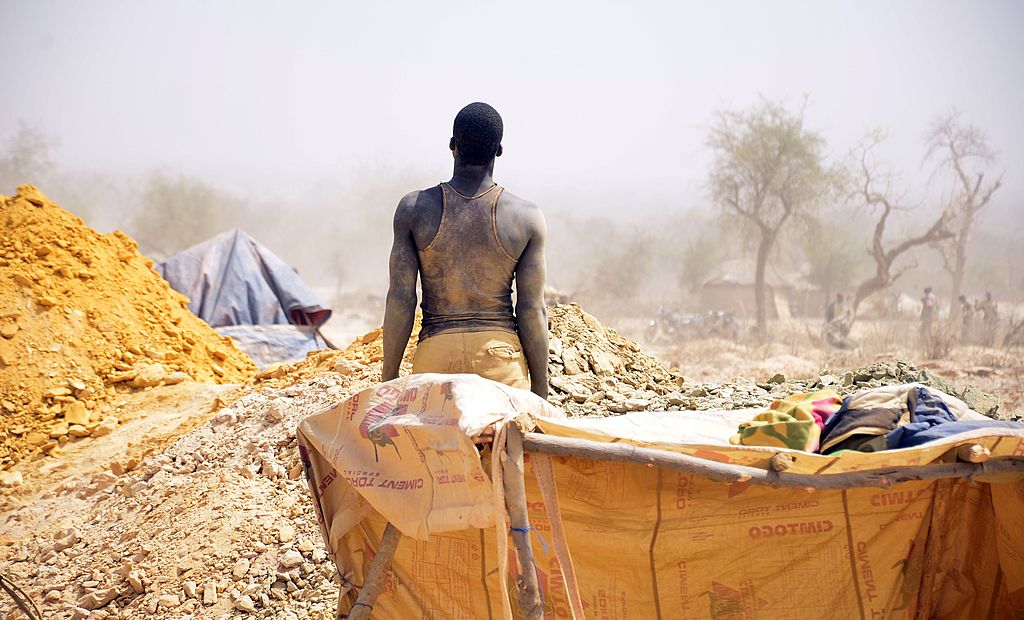The Sahelian terror group Jama’at Nusrat al-Islam wal-Muslimin (JNIM) has expanded across Burkina Faso, Mali and Niger largely by exploiting the region’s resources and communities for its own benefit.
The al-Qaida affiliate has amassed a stable stream of illicit financing that it uses to buy weapons, produce propaganda and recruit new members. Rather than rely on a single flow of income, JNIM has diversified across four primary sources: artisanal mining, kidnapping, livestock theft and money laundering.
“Its engagement in illicit economies has been key to the group’s successful expansion,” Nigerian researchers Egodi Uchendu and Muhammed Sani Dangusau wrote recently for The Conversation. “Dismantling the group’s illicit economies and blocking its financial flows are key to countering its activities.”
Here is a summary of how each funding stream works:
Artisanal mining: JNIM has attacked gold mining communities in southern Burkina Faso and western Mali with the intention of taking control of the local population and a key resource the national governments rely on for income.
Once in control of artisanal mines, JNIM demands a portion of each miner’s take in exchange for protection, analysts say. In southern Burkina Faso near the border with Côte d’Ivoire, JNIM also opened protected forest land for gold mining.
“JNIM’s integration into local illicit economies is critical to its advance, not only in terms of financing itself but also in its efforts to govern civilians,” researchers with the Armed Conflict Location & Event Data project (ACLED) wrote in a recent report. “Illicit economies represent a means through which JNIM can forge social ties in new areas it enters, by offering civilians a means of income, while still denying the state any control over local resources.”
Writing in the Journal of Rural Studies, Fritz Brugger and Tongnoma Zongo note that artisanal miners go along with JNIM’s takeover because they resent the way government authorities treat them. That mindset has local authorities worried that mines could become new recruitment sources for JNIM and other terrorist groups.
Kidnapping: Ransom payments fund JNIM and its regional rival Islamic State Sahel Province (ISSP), but not at the levels they once did. ACLED estimates that the number of kidnappings in Burkina Faso alone rose 30-fold between 2017 and 2022 as JNIM and ISSP expanded in the country.
“When JNIM first infiltrates a community, kidnappings spike,” Flore Berger, senior Sahel analyst for the Global Initiative Against Transnational Organized Crime (GI-TOC), reported in 2023.
Although kidnapping victims can be foreigners, they are more often Burkinabe citizens. Kidnapping generates revenue, but it also allows terrorist groups to control communities.
“It fuels instability while itself being fueled by conflict,” Berger wrote.
Livestock theft: Cattle theft often follows a predictable pattern: JNIM-affiliated men on motorbikes approach Fulani herders and demand that they turn over their animals under threat of violence. The cattle go onto trucks that eventually find their way to livestock markets in Ghana, Mali or Senegal. There, they are quickly sold and butchered or blended with other livestock for sale.
Cattle rustling in Mali has become a central part of the country’s security crisis, according to Berger. A single cow sells for $346. In a country where the individual gross domestic product is less than $3,000 a year, large-scale theft can threaten the health and welfare of pastoralist families and their communities.
“This has dramatic humanitarian, social, and economic effects on communities,” Berger wrote.
Money laundering: As JNIM generates cash from its illicit activities, it needs ways to turn that cash into weapons and other tools of the terrorist’s trade.
Uchendu and Dangusau note that one way JNIM launders money is by lending it to local merchants, investing it with banks and underwriting small shops to make a profit. Doing so helps ensure a constant funding flow to support terrorism.
“It [JNIM] has attached much importance to this illicit economy, to the extent of assassinating those who interfere with its investments,” Uchendu and Dangusau noted.
Ultimately, cutting the legs out from under terrorist groups such as JNIM will require that nations improve security at artisanal mines and strengthen governments’ capacity to track illicit financial transactions, particularly at the small scale JNIM uses in the communities it controls.
Specialized courts focused on financial crimes and terrorism also would help Sahel nations counter the threat, according to the researchers.
“Since finance is the basis of the militant group’s strength, regional security co-operation should be strengthened,” Uchendu and Dangusau wrote. “This would help with systematically tracking illicit flows and stopping them.”

